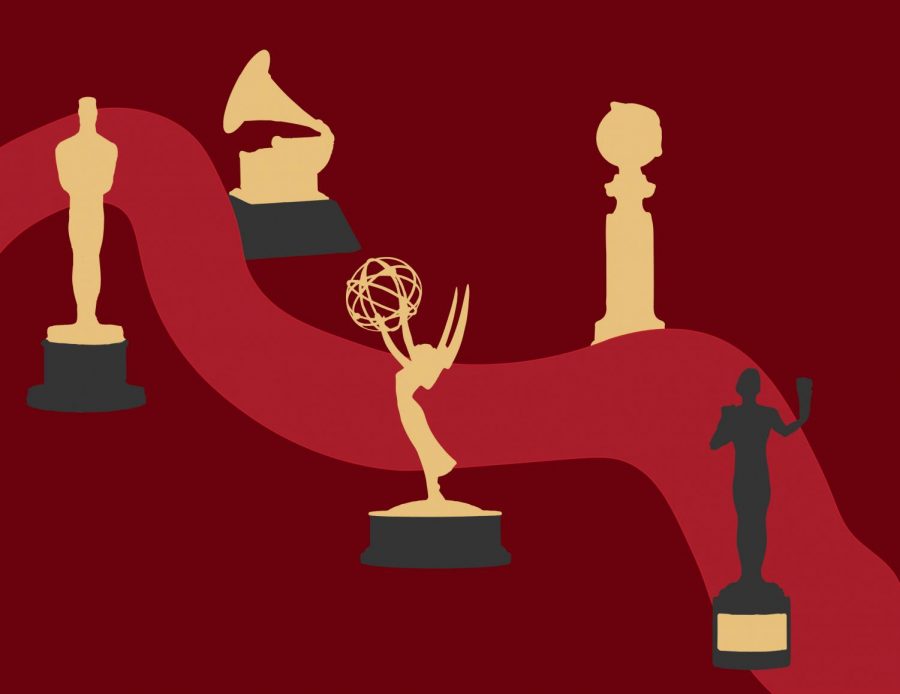Once Upon a Time in Hollywood … Awards Shows Were Relevant
I didn’t watch the Grammys this year, or the year before, or probably the year before that. I didn’t watch the Grammys because I knew the results would be all over Instagram and Twitter the next morning. I could get two and a half hours worth of awards and performances summed up in my morning scroll through social media. So why waste my time watching the show?
In the age of social media and instant access to information, award shows have been struggling to maintain their relevance. Grammys 2020 seemed to be a desperate attempt to appease younger generations. Billie Eilish brought home five awards, four of which were from the night’s most coveted categories (Best New Artist, Album of the Year, Song of the Year and Record of the Year).
Of course, Billie Eilish’s voice is astounding for someone her age, and it is no question that she deserved these awards. However, this did not seem like a decision based on the talent and artistic ability of the nominees. Rather, it seemed to be an attempt to keep the Grammys relevant by letting the (arguably) most relevant pop artist of the year sweep the major categories.
On the other hand, award shows seem to be stuck in the past. TIME recently reported “the median age of viewers for all four top-tier telecasts—Oscars, Globes, Emmys and Grammys—had soared past 50, an increase of more than 10 years since the turn of the millennium.”
This is not a surprising statistic. Award shows used to be a way for people to get together and find out what was considered the best of the best in Hollywood and around the country. The nominations and winners largely determined which songs would dominate the radio, which movies would stay in theaters for months and which television shows would be renewed.
Now, though, much of this power lies in the influence of social media. A celebrity’s Instagram following is just as important as the awards they have won. On Spotify’s artist pages, one can find out how many monthly listeners an artist has, what their ranking on Spotify is and other clear indicators about their popularity. There is no need for a three hour show to find out who is best. Billie Eilish is the fifth most listened to person on Spotify — was anyone really surprised when she took home five awards?
Award shows have also been the subject of controversy due to their lack of diversity. This year, the Golden Globes, Oscars and BAFTAS (The British Academy of Film and Television) were all criticized for their lack of people of color and female nominees.
This is nothing new for these shows. BBC News found that since 2000 only four women have been nominated for Best Director at the Golden Globes, as opposed to over 100 men.
Additionally, the Academy has nominated only three women for Best Director, in contrast to 87 men, in the past 20 years.
Hashtags such as #OscarsSoWhite and #BAFTASSoWhite have circulated online as a result of this lack of diversity. Lupita Nyong’o and Jennifer Lopez, who received heavy praise for their roles in “Us” and “Hustlers,” respectively, were among actors that people feel were snubbed for nominations.
In the era of #MeToo, Black Lives Matter, Generation Equality and other diversity and empowerment movements, there is simply no room for this ignorance. All-white, all-male movies and productions may have dominated the entertainment industry since its beginnings, but younger generations are no longer interested in this monopoly. People are making it increasingly clear that they want to see actors who represent them. Unfortunately, it seems as though award shows are stuck in the past when it comes to this type of recognition.
The rise of streaming services and the plethora of content they are putting out poses a threat to award shows for exactly this reason. The pool of potential nominees has increased exponentially and is becoming much more diverse. According to the Los Angeles Times, “Netflix released 19 original movies from first-time directors in 2019; 11 more are already scheduled for 2020. About half the directors making Netflix debuts last year were women, and several were filmmakers of color.” Streaming services are looking to different demographics to make new and unique pieces of art that will satisfy a larger range of viewers.
People are going to stop caring about the awards if the nominations continue to be so homogenous. Instead of tuning into the Oscars, they are going to log into their Netflix account and watch a movie starring a Latinx cast or directed by a black woman.
The Academy Awards are still a popular, talked-about phenomenon, but just because the awards are timeless doesn’t mean the shows are. These shows need to look to their audience to learn about society’s ever-changing values, and make sure they reflect those values in their nominations. At the same time, they must continue to preserve their goal of praising the most talented, not just the most popular (as with Billie’s sweep at the Grammys). It is a delicate balance, and it will take dedication and thoughtfulness to achieve. But if award shows can’t find a way to do this without selling themselves out or isolating their audience, we may be looking at the end of an era.
Allison Lecce, FCRH ’22, is an international studies major and journalism minor from Westchester, N.Y.










































































































































































































